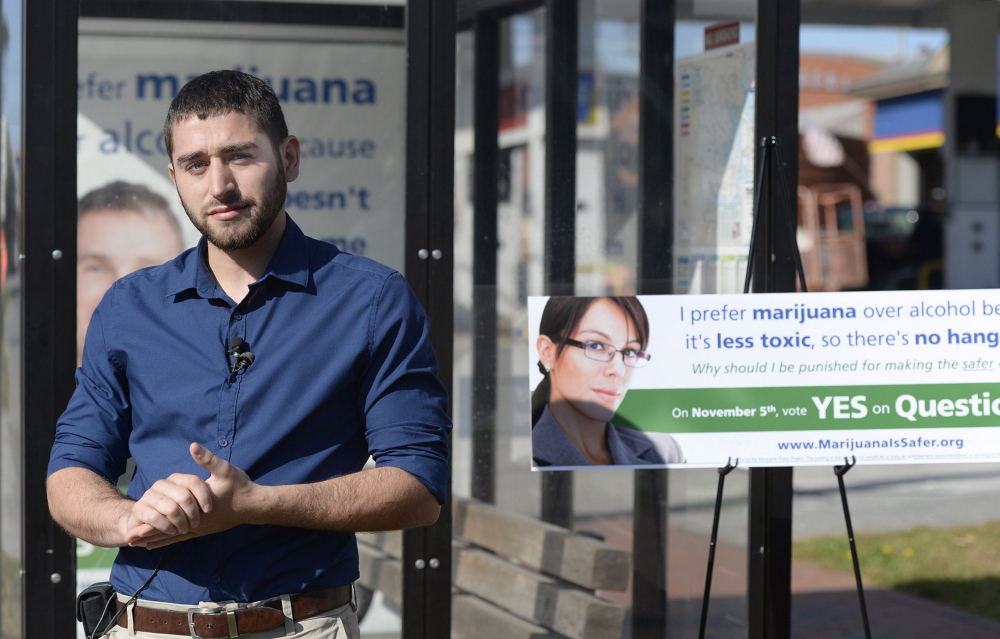The launch last week of a petition drive to legalize recreational marijuana will soon be followed by a second effort to do the same, potentially setting up voters for an unusual 2016 ballot with dueling referendums.
While advocates say they’re confident Maine is ready for legalized pot, having two very similar proposals on the ballot could create a confusing situation for voters trying to wade through the specifics of each plan. And it could set up the Legislature for the difficult task of sorting out conflicts in statute if both are ultimately approved.
Legalize Maine, which calls itself a homegrown effort to legalize pot and support local agriculture, last week became the first of the two groups to formally submit a citizens initiative to the secretary of state. It expects to start collecting signatures in April. Marijuana Policy Project, a Washington D.C.-based group that led local efforts to legalize marijuana in Portland, South Portland and Lewiston, is expected to submit its proposal within the next month.
Both groups want to set up a legal framework to allow the cultivation of marijuana and sales to adults 21 and older. However, the two plans are likely to differ in key areas, such as the sales tax rate, the amount of pot adults will be allowed to possess and whether use will be allowed outside of private homes.
‘VOTERS ARE SMART’
“Voters are smart. They vote on complex issues all the time,” said David Boyer, Maine political director for the Marijuana Policy Project. “I think they’re smart enough to make sense for Maine.”
Whenever there are multiple ballot questions related to the same issue, there is the potential for voters to reject them all, said Ronald Schmidt, an associate professor of political science at the University of Southern Maine. That scenario is more common in other states where several competing questions sometimes go before voters, but having two Maine campaigns competing for funding could drive down the likelihood of success for each, he said.
“With two initiatives, it may drive down the willingness of voters to take a chance on either of them,” Schmidt said. “There could be the effect of voters being suspicious of both, but I don’t think that will happen. I would worry about the campaigns getting a little nasty.”
Secretary of State Matthew Dunlap said having two similar referendums is “complicated and not something people deal with every day.”
“If you have two competing pieces of citizen initiative legislation and they conflict with each other and both pass, then the Legislature has to sort it out,” he said. “Voters are pretty smart and they know what they want and what they don’t want. People are very careful about making sweeping changes to the law.”
POSSIBLE ‘MESS’ FOR LAWMAKERS
Rep. Diane Russell, D-Portland, said the possibility of two marijuana referendums passing and leaving a mess for the Legislature to sort out is exactly the situation she is trying to avoid by asking the Legislature to move forward with legalization first. Russell has introduced legalization bills before and the final language of her new bill has yet to be released.
“I fundamentally believe the Legislature should be the party that crafts the policy. The Legislature should get ahead of this issue. This is the last session we can do that,” she said. “We can lay out the plan instead of trying to interpret what the voters wanted (after the fact). The question of whether to legalize or not should be left to the people, but it does need to be done cleanly and responsibly. It’s going to be a mess if we don’t do it that way.”
The leaders behind the two separate legalization efforts say they aren’t too concerned about the potential for similar referendums.
However, Paul McCarrier, president of Legalize Maine, said Mainers only need one referendum and it should be crafted by a local group rather than out-of-state interests. He said attempts to work with the Marijuana Policy Project were unsuccessful because of “irreconcilable differences.”
“We are the first group to put local people before national interests and focus on stimulating our local economies,” he said, noting his group is positioning Maine to be the “weed basket for New England.”
Legalize Maine’s plan would allow adults 21 and older to possess 2.5 ounces of marijuana outside of their homes, require that 40 percent of cultivation licenses go to small-scale farmers and allow marijuana social clubs, where people could buy and use the drug. It would also tax marijuana sales at 10 percent, a higher rate that the one that applies to prepared food, lodging and liquor.
Boyer said the Marijuana Policy Project is still working on its proposal, but it is likely to propose a tax rate higher than the 10 percent laid out by Legalize Maine. It would also likely only allow Mainers to possess up to an ounce of marijuana, the same amount allowed in Colorado, where Marijuana Policy Project successfully led the charge to legalize pot.
Boyer said the two groups had been sharing drafts of their proposals and that most provisions are similar. He said he was surprised by McCarrier’s announcement that the two groups couldn’t work together, but that he’s not dwelling on that or on the potential of two referendums.
“Right now we’re not going to worry about two competing initiatives because it’s not an easy task to get on the ballot,” he said. “Right how we’re more concerned with engaging in public dialogue so we can talk about why regulation works and why it’s better for Maine.”
Send questions/comments to the editors.





Success. Please wait for the page to reload. If the page does not reload within 5 seconds, please refresh the page.
Enter your email and password to access comments.
Hi, to comment on stories you must . This profile is in addition to your subscription and website login.
Already have a commenting profile? .
Invalid username/password.
Please check your email to confirm and complete your registration.
Only subscribers are eligible to post comments. Please subscribe or login first for digital access. Here’s why.
Use the form below to reset your password. When you've submitted your account email, we will send an email with a reset code.